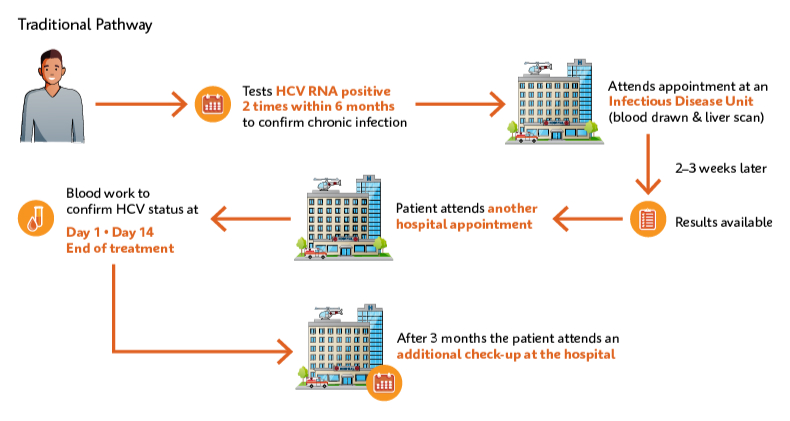2m Read
September 10, 2024
COMMUNITY AND GLOBAL HEALTH
Impact Story
Danish HCV Testing Program Improves Patient Management & Access
Making healthcare services available to People Who Inject Drugs (PWID) is challenging because these individuals often face difficulties, including homelessness, psychiatric illnesses, and other problems. These factors create significant barriers when it comes to testing and treating PWID for HCV through the traditional care pathway, which requires that patients attend several appointments at a hospital for diagnosis and treatment.
In Denmark, there’s a critical need to provide better access to HCV testing and linkage to care for HCV-infected PWID through point-of-care testing.
To overcome this barrier, a mobile clinic managed by the Brugernes Akademi (Users Academy), brings point-of-care testing to open drug scenes, homeless shelters, and other places where PWID live in the capital region of Denmark.

Traditional pathway data provided by Brugernes Akademi (Users Academy).

The Brugernes Akademi is an association of, and for, former and active drug users, including intermittent users, that aims to purpose is to improve conditions and rights for drug users throughout Denmark.
In the mobile unit, the team implements a two-step point-of-care testing approach. First, a rapid HCV antibody test is done. If the result is positive, a PCR test is performed. The PCR test is done using the Xpert® HCV VL Fingerstick test, which detects and measures the RNA viral load in under an hour directly from a blood sample drawn from a simple finger prick.
HCV RNA positive people immediately receive peer-support from the Brugernes Akademi and are fast tracked to treatment at the Infectious Disease Unit in the hospital. At the hospital, patients receive support from a Brugernes Akademi peer counselor, who helps them navigate through the hospital process. This point-of-care test-and-treat model reduces the risk for disease transmission within the community compared to the traditional testing and treatment pathway.
The Brugernes Akademi also brings the medication to the patient and does the follow-up bloodwork in the mobile clinic during visits. The streamlined process ensures that the patient only needs to go to the hospital once.
Very few patients have been lost to follow up through this program when compared to the traditional pathway: during 12 months of the program being offered, 774 people were tested, 72 tested HCV RNA positive. Of those, 63 were evaluated in the clinic, and 55 of them initiated treatment.

CE-IVD. In Vitro Diagnostic Medical Device. May not be available in all countries. Not available in the United States.
Projections and Realized Results are specific to the institution where they were obtained and may not reflect the results achievable at other institutions
Reference:
Lazarus J V, et al. The Copenhagen test and treat hepatitis C in a mobile clinic study: a protocol for an intervention study to enhance the HCV cascade of care for people who inject drugs (T’N’T HepC). BMJ Open 2020;10:e039724. https://bmjopen.bmj.com/content/bmjopen/10/11/e039724.full.pdf
Read Next
More







